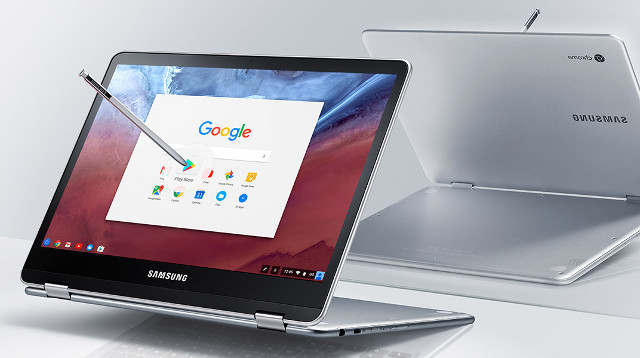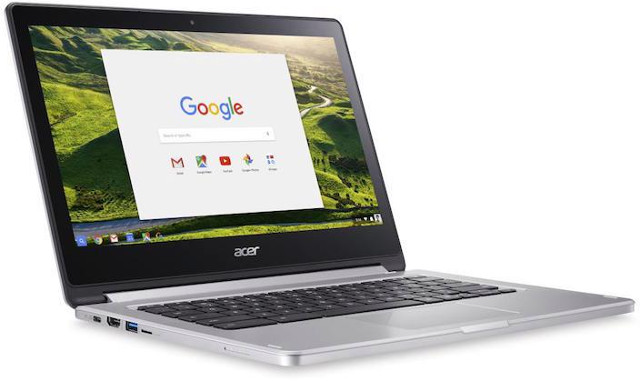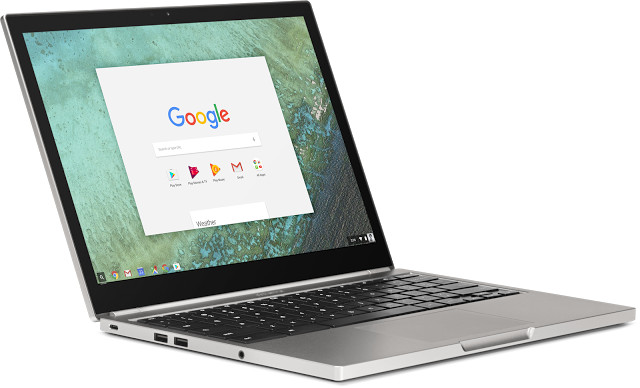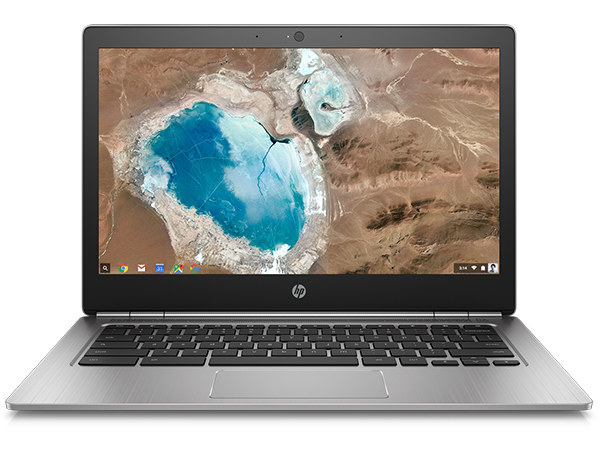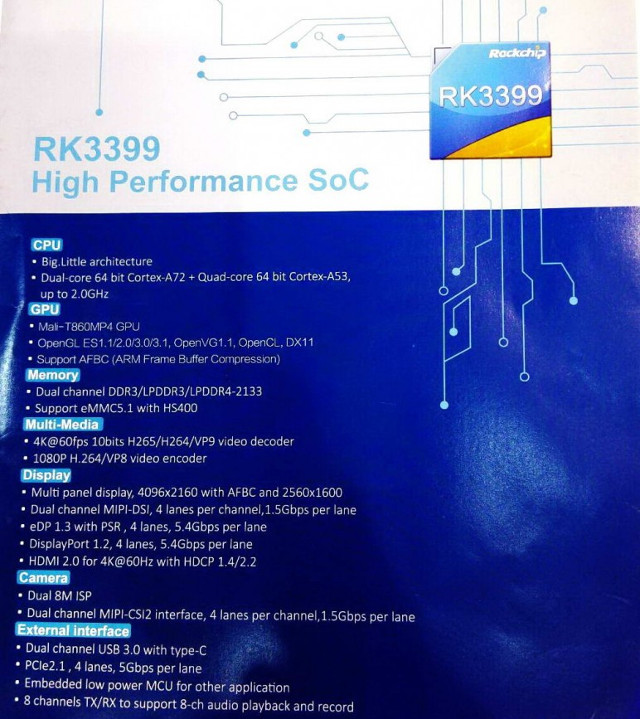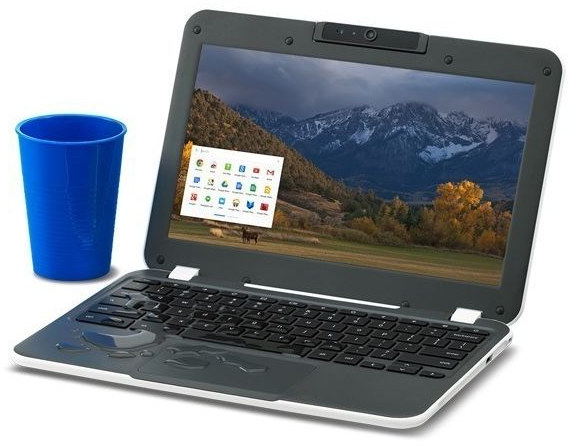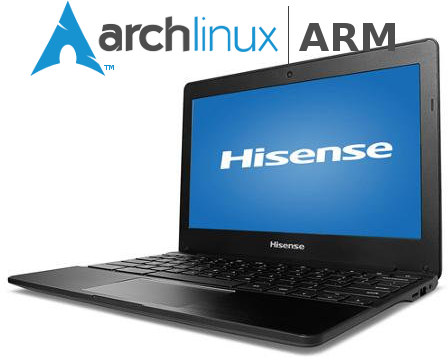Considering Linux kernel commits related to RK3399 processor almost always involves developers with a chromium.org email address, beside rock-chip.com ones, we had to expect a Rockchip RK3399 based Chromebook sooner or later, and based on various leaks, Samsung Chromebook Pro appears to be one the RK3399 Chromebooks to come to market very soon. We’ll see some of the key features and pictures, and technical details on websites such as Adorama, so we can have a pretty good idea of Chromebook Pro OP1 / 513C24I specifications, even though Samsung and Google have yet to officially launch the device: SoC – Hexa core processor with 2x ARM Cortex A72 cores @ up to 2.0 GHz, 4x ARM Cortex A53 cores (Which has to be Rockchip RK3399 SoC, or a special RK3399-C specific to Chromebooks) System Memory – 4 GB LPDDR3 RAM Storage – 32 GB eMMC Flash Storage Display – 360°-rotatable 12.3” LED […]
Acer Chromebook R13 is Powered by Mediatek MT8173 64-bit ARM Processor
The just announced Acer Chromebook R13 is both the first Mediatek Chromebook and the first 64-bit ARM Chromebook thanks to its Mediatek MT8173(c) quad core processor with two ARM Cortex-A72 cores, and two ARM Cortex-A53 cores. The Chromebook is also fitted with a 13.3″ touchscreen display, 4 GB RAM, and up to 64GB internal storage. Acer Chromebook R13 specifications: SoC – Mediatek M8173C quad core processor with 2x ARM Cortex A72 cores, 2x ARM Cortex A53 cores, and a PowerVR GX6250 GPU System Memory – 4GB LPDDR3 RAM Storage – 16, 32 or 64 GB eMMC flash Display – 13.3″ touchscreen IPS display; 1920×1080 resolution; 10-point touch; 360-degree hinge design Audio – Integrated microphone, dual built-in speakers, microphone and headphone jacks Video Output – HDMI Camera – HD webcam (1280×720 resolution) with HDR and 720p HD audio/video recording Wireless Connectivity – 2×2 MIMO 802.11ac WiFi and Bluetooth 4.0 USB – […]
Google Play and Android Apps Are Coming to (Recent) Chromebooks, Chromeboxes, and Chromebases
There’s been talks about Android and Chrome OS merging for many years, and while it’s unclear whether it will ever happen, both operating systems’ features are converging, with the latest development officially bringing Android apps and the Google Play store to Chromebooks. Developers will have very little to modified on their Android apps, except possibly setting touchscreen support, and a few other options in the manifest file. Google listed a few benefits of Android apps on Chromebooks: Android Apps can be shown in 3 different window sizes Users can multi-task with multiple Android apps in moveable windows along with a full desktop browser within Chrome OS interface. Keyboard, mouse, and touch input will seamlessly work together Users will get Android notifications on their Chromebooks Android apps benefit from the Wifi or Bluetooth connectivity setup by the user or the administrator File sharing is seamless between Chrome and Android apps through […]
HP Chromebook 13 G1 Features Skylake Pentium or Core M Processor, 4 to 16GB RAM, and a 3200×1800 Display for $499 and Up
HP Chromebook 13 G1 is the middle ground between Google’s $1000 Chromebook Pixel and the cheap Rockchip RK3288 chromebooks, thanks to a choice of low power Skylake Core M processor, plenty of memory, and for people who loathe 1366×768, or even 1920×1080 displays, a 13.3″ display with 3200×1800 resolution. HP Chromebook 13 G1 specifications: SoC (four options) Intel Pentium 4405Y dual core / quad thread processor @ 1.5 GHz with Intel HD Graphics 515 GPU @ 300/800 MHz (TDP: 6W) Intel Core m3-6Y30 dual core / quad thread processor @ 900 / 2.2 GHz with Intel HD Graphics 515 GPU @ 300/850 MHz (TDP: 4.5W) Intel Core m5-6Y57 dual core / quad thread processor @ 1.1 / 2.8 GHz with Intel HD Graphics 515 GPU @ 300/900 MHz (TDP: 4.5W) Intel Core m7-6Y75 dual core / quad thread processor @ 1.2 / 3.1 GHz with Intel HD Graphics 515 GPU @ […]
More Details about Rockchip RK3399 Cortex A72 SoC: 4K H.264/H.265/VP9, USB 3.0, PCIe, and DisplayPort
We already knew Rockchip RK3399 was going to be a powerful processor with two Cortex A72 cores clocked at up to 2.0GHz, and four Cortex A53 cores teamed with a Mali-T860MP4 GPU. The processor was also said to support 4K H.265 video decoding up to 60 fps, HDMI 2.0 video output, and Gigabit Ethernet. But the company is now at Mobile World Congress 2016, and has disclosed more details. Some of the newly introduced features include: Multi-media 4K @ 60fps 10-bit H.265/H.264/VP9 video decoder 1080p video encoding with H.264 or VP8 Display HDMI 2.0 with HDCP 1.4/2.2 DisplayPort 1.2 and eDP 1.3 with PSR (Panel Self Refresh) Dual channel MIPI-DSI Camera – 8MP ISP, dual channel MIPI-CSI2 External Interfaces 2x USB 3.0 ports with type-C support PCIe 2.1, 4 lanes, 5Gbps per lane 8 channels TX/RX audio for playback and record Embedded low power MCU for other applications (power control?) […]
CTL NL6x Rugged Chromebook Doubles as a Whiteboard
Chromebooks are used by all kind of people, but they appear to be especially popular in classrooms. However, pupils can be “brutal” with their toys and tools, so that’s probably why CTL designed NL6x rugged Chromebook which can basically be walked on as the top cover resists up to 365 pounds pressure, includes anti-peel keys and a water-resistant keyboard, as well as reinforced ports, hinges, and power plug ports. It can also withstand 70cm high drops, and the back of the screen also doubles as a whiteboard. CTL NL6x Chromebook specifications: SoC – Intel Celeron N2940 quad core processor @ 1.83 GHz / 2.25GHz (Burst freq.) with Intel HD graphics (7.5W TDP; 4.5W SDP) System Memory – 4GB Storage – 16GB eMMC + 2-in-1 SDHC/MMC card reader Display – 11.6″ LED LEC with 1366 x 768 resolution Video Output – HDMI Audio – HDMI output, 3.5mm combo jack for microphone […]
NayuOS is a Developer Friendly Chromium OS Fork without Google Services
People at Nexedi, an European based open-source software publisher, are doing a lot of development work on Chromebooks, but with Chrome OS, all your data is kept on Google servers when you login, and by default the OS basically runs Chrome browser with barely any development tools. So the company leveraged Chromium OS, the open source version of Chrome OS, to create their own operating system, called NayuOS, that does not run any proprietary software, does without Google servers, and comes with git, nmp and other developer tools by default. The operating system should also provide a better Chromebook experience in China, thanks to the company’s re6stnet app and GrandeNet system allowing to have IPv6 available even when ISPs only provide IPv4, and to work around the unreliable Internet infrastructure in China. The source code and instructions to build an image yourself are available, but the company also released binary […]
Arch Linux ARM Can Now Be Installed on Rockchip Based Hisense Chromebook
Hisense Chromebook C11 is one of the $149 Chromebooks powered by Rockchip RK3288 processor recently launched. So far, I could not find instructions to install any Linux desktop distributions on this type of platform, but now Hisense Chromebook (codename: veyron_jerry) appears to be the first Rockchip platform officially supported by Arch Linux ARM (ALARM). Hardware video decoding won’t work, 3D graphics acceleration is most probably not working either, and it’s not clear if all hardware parts are supported, and the built-in wireless module is said to break under high throughput, so a USB WiFi dongle or Ethernet adapter is recommended instead. But at least if you follow the installation instructions, you won’t modify your Chrome OS installation on the eMMC flash, as Arch Linux ARM will boot from external storage, either from an SD card or a USB flash drive, so it should be completely safe to try it out. […]


